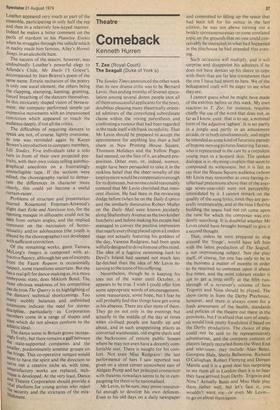Theatre
Comeback
Kenneth Hurren
T. Zee (Royal Court) The Seagull.(Duke of York's) The Sunday Tunes announced the other week that its new drama critic was to be Bernard Levin, thus ending months of fevered speculation among several dozen people (not all of them unsuccessful applicants for the post), doubtless pleasing many theatrically oriented admirers of the convolute sl subordinate clause within the roving parenthesis and confirming a rumour that had been regarded in the trade itself with frank incredulity. That Mr Levin should be prepared to accept the appointment for anything less than a half share in New Printing House Square, Thomson Holidays and the Yellow Pages had seemed, on the face of it, an absurd proposition. Other men, or, indeed, women, might have been persuaded to take it in the reckless belief that the sheer novelty of the employment would be compensation enough for its distresses, but no one could reasonably contend that Mr Levin cherished that innocent illusion. He had been in the reviewing dodge before (when he on the Daily Express and the similarly diminutive Robert Muller on the Daily Mail were known jocularly along Shaftesbury Avenue as the two kosher butchers) and before making his escape had managed to convey the positive impression that nearly everything placed upon a London stage not actually featuring his goddess of the day, Vanessa Redgrave, had been quite wilfully designed to drive him out ofhis mind. The idea of a fugitive swimming back to Devil's Island had seemed not much less far-fetched than the idea of Mr Levin returning to the scene of his suffering.
Nevertheless, though he is keeping his toes out of the water until October, it appears to be true. I wish I could offer him some appropriate words of encouragement, some reassurance, some hope, but I fear he will probably find that things have got worse in his absence. There are also more of them. They go on not only in the evenings but actually in the middle of the day at times when civilised people are hardly up and about, and in such unappetising places as converted warehouses, old engine sheds and the backrooms of remote public houses where he may not even have a decently comfortable seat. There is naught for his comfort. Not even Miss Redgrave: the last performance of hers I saw reported was given on a street corner somewhere east of Aldgate Pump and her principal connection with theatres nowadays seems to be in campaigning for them to be nationalised.
Mr Levin, to be sure, may prove resourceful enough to develop his, own defences. Even in his old days on a daily newspaper and committed to filling up the space that had been left for his notice in the last edition, he was not above turning out a briskly spontaneous essay on some unrelated topic on the grounds that no one could conceivably be interested in what had happened in the playhouse he WA attended that evening.
Such occasions will multiply, and it will surprise and disappoint his admirers if he does not have devices up his sleeve to cope with them that are far less transparent than the one I have had resort to here. We of the beleaguered craft will be eager to see what they are.
I cannot guess what he might have made of the exhibits before us this week. My own reaction to T. Zee, for instance, requires chiefly the use of the word that does not, as far as I know, exist: that is to say, a nominal form of the adjective 'aghast'. It is set partly in a jungle' and partly in an amusement arcade, or in both simultaneously, and might be intended as some kind of futuristic parody of bygone moving pictures featuring Tarzan, who is represented in the cast by a corpulent young man in a leopard skin. The spoken dialogue is in rhyming couplets that seem to compound its witlessness, but it is fair to say that the Sloane Square audience (whom Mr Levin may remember as once having intellectual pretentions above that of the average seven-year-old) were not perceptibly intimidated by it. I cannot remark on the quality of the sung lyrics, since they are generally impenetrable, and at the time I fled the building the music had not yet come upon the tune for which the composer was evidently searching. It is doubtful whether Mr Levin could have brought himself to give it a second thought.
That, unless he were prepared to slog around the 'fringe', would have left him with the latest production of The Seagull, a not unpromising subject. Not the play itself, of course, for one has only to be in the business a matter of months in order to be required to comment upon it about five times, and the most tolerant reader is apt to get a little sniffy at the fifth runthrough of a reviewer's notions of how Trigorin and Nina should be played. The show came in from the Derby Playhouse, however, and there is always room for a fresh assessment of the health, standards and policies of the theatre out there in the provinces, but I'm afraid that sort of analy sis would look pretty fraudulent if based on the Derby production. The choice of play could not be said to be representatively adventurous, and the company consists of players largely recruited from the West End and television: they include Alan Bates, Georgina Hale, Sheila Ballantine, Richard O'Callaghan, Robert Flemyng and Doreen Mantle and it is a good deal less surprising to see them all in London than it is to hear they have arrived from Derby. Trigorin and Nina ? Actually Bates and Miss Hale play them rather well, but let's face it, you wouldn't want me—or even Mr Levin— to go on about them ligain.


































 Previous page
Previous page